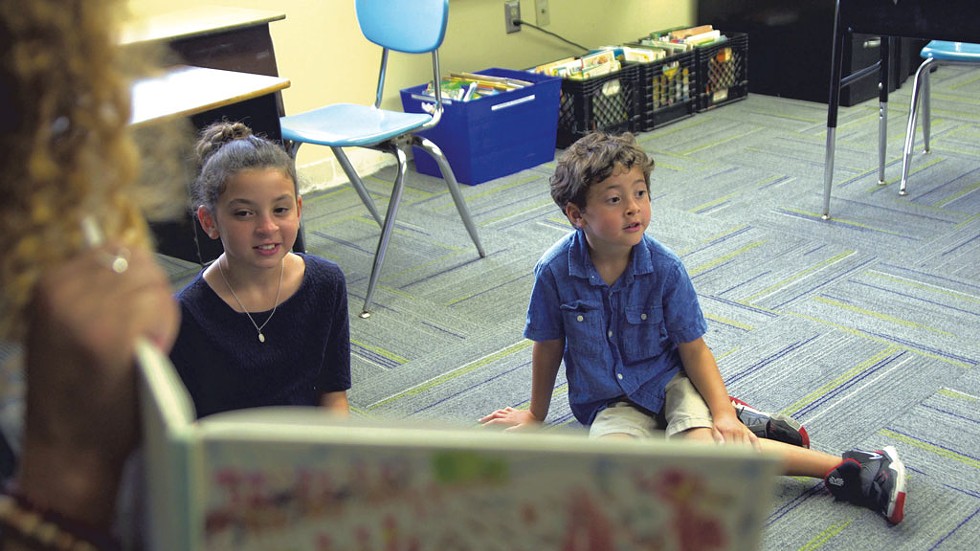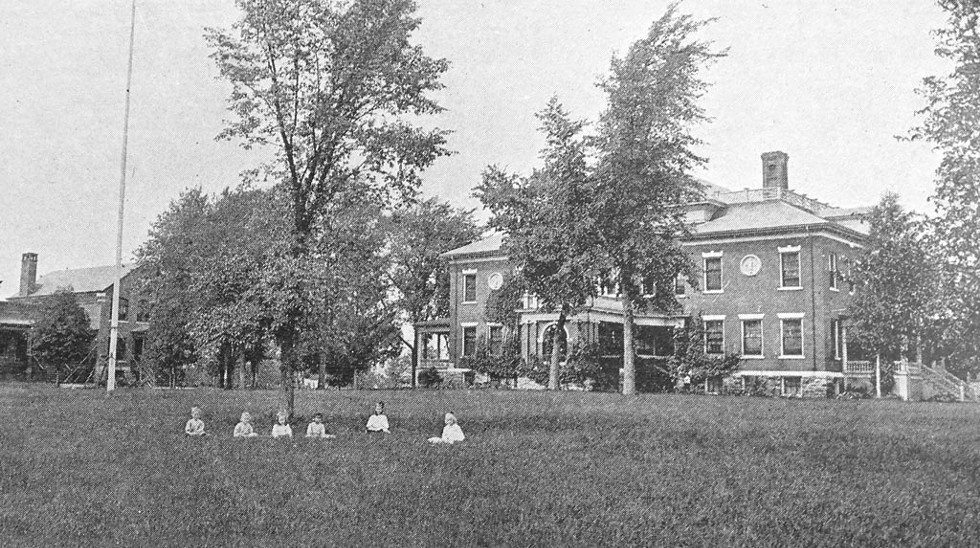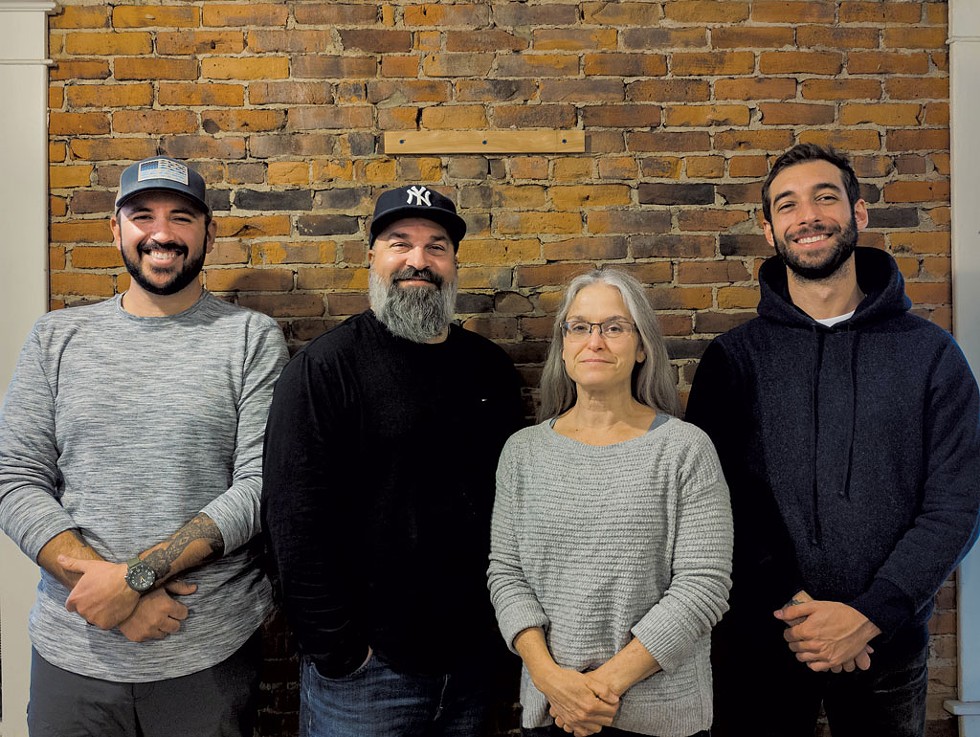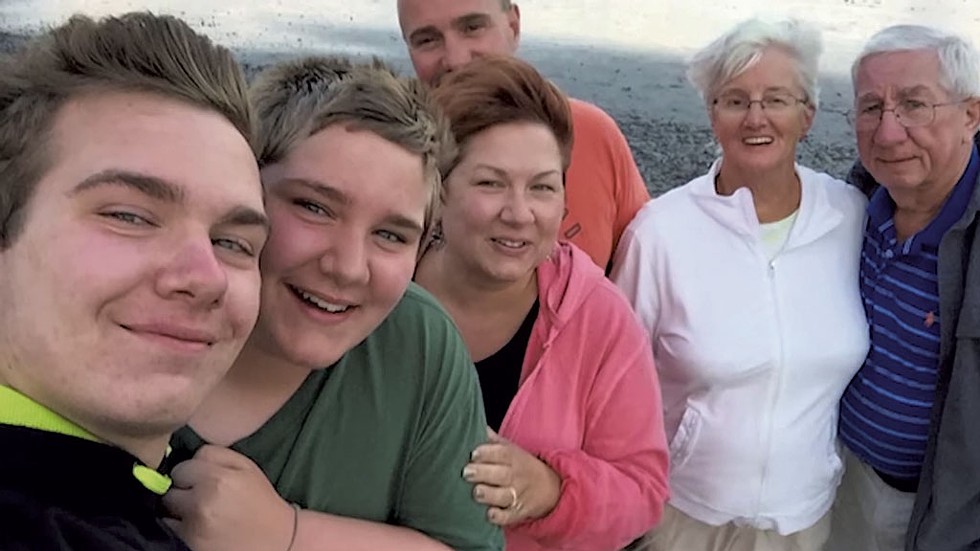
- Courtesy
- Baird School students in a classroom
When Kelly Deforge's youngest son was diagnosed with an anxiety disorder at age 6, the principal of his public school told her, "We're taught to teach. We're not taught mental health."
By the fifth grade, her son had a breakdown and could no longer attend public school. Deforge turned to Howard Center for assistance. Her son was enrolled at the Baird School, one of three independent schools operated by Howard Center that serve students with different learning needs. Unlike at his public school, the schools serving students through Howard Center have access to a large, fully integrated, multidisciplinary team of social workers, special educators, speech language pathologists and other professionals.
"There was just more understanding when he got to school; if he couldn't do it, they made it work," Deforge said in a video testimony for Howard Center. "They figured out what he needed to be successful that day."
The independent school Deforge's son attended is just one of the many programs under Howard Center's very large umbrella. The sprawling nonprofit helps more than 19,000 Vermonters a year. It operates 50-plus outpatient, outreach and residential programs — including employment support and counseling, criminal justice services, and family respite, to name a few — in 60 different locations around the state. In many cases, Howard Center steps in when no one else can or will. It fills in the gaps in care, helping keep Vermonters from falling through the cracks.
"We are deeply embedded in the fabric of our community. It would be a much less supportive community without our services," said Denise Vignoe, Howard Center's Director of Development and Communications.
From Civil War widows to resettled refugees

- Courtesy
- The Home for Destitute Children in Burlington
Howard Center's history dates back to 1865. Its initial mission: to support Civil War widows and orphans. It started as the Home for Destitute Children in Burlington, located on Shelburne Road where the Market 32 is now.
In the 1950s, Howard Center began employing psychiatric social workers to help the children and families in its care and formed a department for counseling services. In 1966, Howard Center was designated by the Vermont Department of Mental Health as the community mental health agency serving Chittenden and southern Grand Isle counties.
In 1994, three agencies that served different parts of Chittenden County met to discuss how they could best help people in the area in need. As a result, Howard Center for Human Services, the Baird Center for Children and Families, and Champlain Drug and Alcohol Services all merged. This larger organization, known as Howard Center, now serves three primary functions: supporting mental health, providing substance-use and recovery services, and serving people with developmental disabilities.
In addition to all the work Howard Center does independently, it also partners with other organizations to assist communities in need. Over the past decade, the agency has made an increasing commitment to diversity, equity and belonging. For example, Howard Center has learned how to use its community partnerships to better serve the immigrants and refugees who relocate to Vermont. Just this past year, Howard Center hired several cultural liaison staff to provide support, improve access to services and enhance resources for refugees who do not speak English.
"A lot of those refugees come from traumatic experiences, such as war and leaving their home countries," said Thato Ratsebe, a board member at Howard Center and the Associate Director and Programs Manager for the Association of African Americans Living in Vermont, a Howard Center community partner. As the AALV helps connect refugees with housing and employment, it can also direct them to Howard Center programs that could help them.
"To do this job, you have to have heart," Ratsebe said.
Reducing the Stigma

- Courtesy
- The Howard Center Street Outreach team
Last month, Kelly Devine, Executive Director of the Burlington Business Association, was walking through downtown Burlington when she saw someone passed out on the sidewalk.
"I didn't want to call the police," she said. Instead, Devine dialed Howard Center's Street Outreach team. They're the first call she makes, she said, and she educates businesses downtown to follow suit.
"Howard Center staffers have training in dealing with de-escalation and mental health, so they're my go-to when I see situations downtown that aren't illegal but just don't look right," she said.
The team has helped 4,261 contacts in the past year and made 478 referrals for services within Howard Center and to other programs in the community. "We try to reduce stigma, and our staff does that on the front lines every day," said Bob Bick, Howard Center's Chief Executive Officer.
Tammy Boudah, the team leader, hits the bricks of Church Street every weekday morning checking on people who slept outside. From there, she walks around, gets to know people, and responds to calls from concerned merchants, community members and families.
"We offer substance-use treatment and help with housing searches, but my job is more about figuring out what these people are looking for and what they need," Boudah said. Once she knows that about a person, she can help them make a plan.
The Street Outreach team was formed in Burlington over 20 years ago with assistance from United Way, the University of Vermont Medical Center and the Burlington Business Association; the BBA helped gather the initial funding. After its first year, Howard Center surveyed its clients and found that many of them saw the staff as "folks that were trying to help them out."
"There was no patient-to-provider or we-they barrier," Bick said.
Howard Center opened the state's first methadone treatment center in 2002 with just 70 clients. Today it serves about 2,000 people with opioid-use disorder across several programs. Dr. John Brooklyn, the clinic's Medical Director, was the first to conceive of the pioneering Hub and Spoke system, a model for the country for treating opioid-use disorder. Howard Center introduced the state's first "hub," the Chittenden Clinic, which offers daily support and medication for patients with addictions. The "spokes" offer services that are integrated into the patients' general health care and wellness.
The Howard Center's Safe Recovery program is a part of what it does to reduce stigma. When Jess Kirby worked there, she said, "I get to be there for people at the hardest times in their life and often get to see them get better." Kirby gave Narcan training in the community and helped people get the supplies they needed. Kirby is in recovery herself, and the services she provided are ones that she once used.
"It felt awesome to be that for someone else," she said.
'We're the Helpers'

- Courtesy
- The Deforge family
Katherine Connolly, Board Member and Chair of the Board Human Resources Committee at Howard Center, has a son who has been a client since he was diagnosed with mental illness and developmental disabilities at age 9. Now at 33, he is stable, employed part time and lives in a supported home environment.
"We have learned over time that structure and stability are crucial," Connolly said. When COVID-19 began in 2020, her family lost their son's caregiver and tried unsuccessfully to find a replacement for three years. The difference was startling, she said. Her son's eating and sleeping patterns changed, and he started showing up to work late and having mood swings. Not having access to care affects his entire life.
In February, they successfully found a caregiver, and he returned to what Connolly calls a "normal existence." But they will never get those three years back.
Connolly's son is not alone. The demand for services has never been higher as more and more Americans struggle with their mental health. At the same time, the services they're leaning on are stretched thinner than ever.
"While having sufficient funding is a perennial problem, staffing is now the primary issue we face as an organization," Bick said. Currently, Howard Center has nearly 200 open positions, which is about 15 percent of its workforce.
"We have an incredible staff here who want to do the work, but it's challenging and disheartening when we're not at full capacity," he added. "We know we are not alone. Virtually every community-based agency is struggling to find staff."
Since the pandemic, Howard Center has seen a decrease in applications and employee retention — the work is demanding, and more than half of the employees it hires will leave within two years. Because the organization depends largely on state and federal funding, it often serves as a training ground for staff entering the field who then move on to higher salaries offered in the private sector or to organizations that have significant private insurance income.
"It takes a special kind of person to spend most of their waking hours working with people who are struggling or suffering," Vignoe said.
Vignoe recalled what Mister Rogers once said about finding hope in a crisis by looking for those who are helping others. "We're the helpers," she said.
Help Is Here.
As a 501(c)(3) tax-exempt organization, we graciously accept donations of any size to support our critical and life-saving work. Visit our donation page at howardcenter.org to make a contribution.
Want to be one of the helpers? Check out Howard Center's job openings at howardcenter.org/career-opportunities. It includes positions at every skill and experience level. Many programs operate 24 hours a day, seven days a week, making "nontraditional" schedules available.
